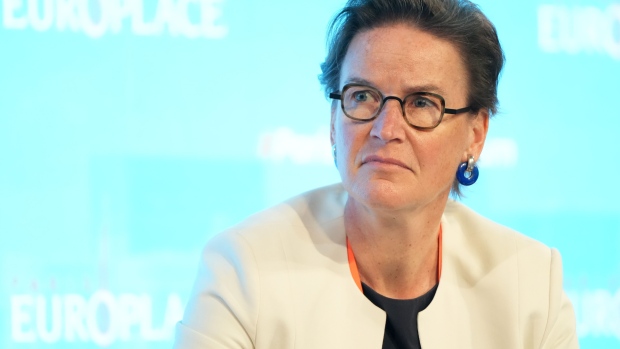Dec 20, 2023
EU Markets Watchdog Sees Possible Crackdown of Carbon Credits
, Bloomberg News

(Bloomberg) -- European banks, investors and companies operating in the carbon offsets market may face new regulations, as underlying greenwashing concerns persist and interest in the sector increases.
Regulatory oversight of the so-called voluntary carbon market might be something the next European Commission considers, said Verena Ross, chair of the European Securities and Markets Authority, the bloc’s markets watchdog.
European regulators already have rules for the EU Emissions Trading System, a so-called compliance carbon market in which companies trade permits to emit carbon dioxide in keeping with an overall cap on total emissions.
It’s now possible they’ll turn their attention to the voluntary market, where companies trade carbon credits, units that each represent one ton of CO2 that’s either avoided or removed from the atmosphere, Ross said in an interview.
The new commission, which is due to be appointed following European elections in June, “might at some point decide that these voluntary markets should also be subject to a legislative framework,” she said.
Ross recently oversaw a consultation by the International Organization of Securities Commissions, the global standard setter for securities regulators, that focused on the integrity of the voluntary carbon market. The IOSCO review outlined persistent concerns among members and proposed a set of recommendations for financial regulators.
In Europe, the decision to regulate the voluntary carbon market lies with the bloc’s parliament and commission. ESMA’s role is to then flesh out what rules and regulations make sense. Financial regulators in individual member states are responsible for overseeing compliance in their jurisdictions and ESMA works with them to ensure they’re doing so properly and consistently.
Carbon credits also might fall under the purview of financial regulators through other channels, Ross said. There’s “clearly interest from some of the derivatives markets to potentially incorporate some of these instruments into their product range,” she said, adding that would automatically make them subject to existing rules.
In recent years, the voluntary carbon market has come under scrutiny for overblown green claims. Last month, the world’s top seller of carbon credits parted ways with its chief executive, following months of allegations that the company overstated the climate impact of the products it sold.
Read More: World’s Biggest Carbon-Offset Seller Says CEO Steps Down
The US Commodities Futures Trading Commission unveiled its proposed guidance for carbon offset derivatives contracts earlier this month at the COP28 summit in Dubai. Several other initiatives also were introduced in an attempt to repair the market’s reputation.
For now, some of the firms that trade the products have suffered sizeable losses. Last year, Dutch trading house ACT had to destroy about 1.5 million credits after realizing they were valueless. Vitol, the world’s largest independent commodity trader, was left with 75 million stranded credits, equivalent to twice Switzerland’s annual CO2 emissions.
Meantime, bankers are looking to use carbon credits as a kind of cash equivalent alongside debt and equity to help finance climate projects in emerging markets.
For Ross, similar standards should apply to carbon credits as for other financial products. “Whatever instrument you trade in a well-functioning, stable, effective market needs to be grounded in some kind of basic standardization,” she said.
©2023 Bloomberg L.P.






